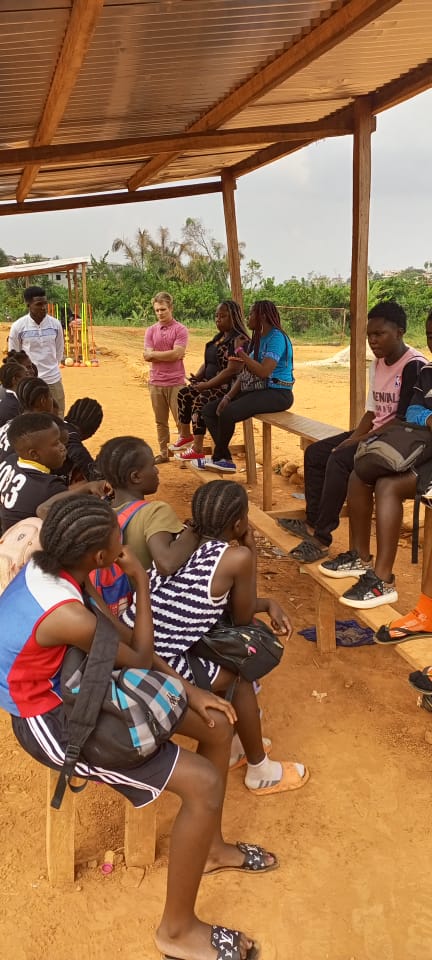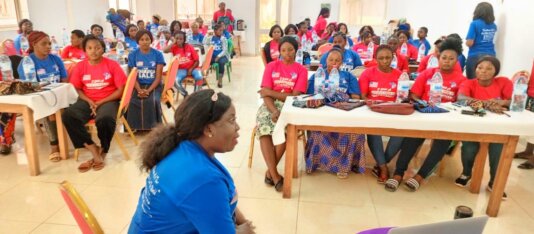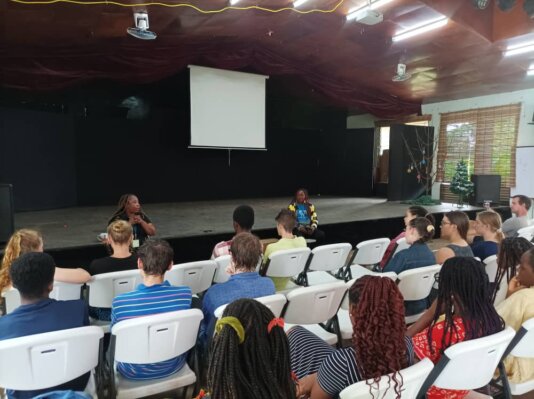- About
- Topics
- Picks
- Audio
- Story
- In-Depth
- Opinion
- News
- Donate
-
Signup for our newsletterOur Editors' Best Picks.Send
Read, Debate: Engage.
| April 02, 2024 | |
|---|---|
| topic: | Human Trafficking |
| tags: | #human trafficking, #human rights, #forced labour, #modern slavery, #women's rights |
| located: | Kenya, Kuwait, Nigeria, Philippines, Sweden, Cameroon, Togo, Benin, Ivory Coast (Côte d'Ivoire) |
| by: | Bob Koigi |
When Francisca Awah left her home in Cameroon for Kuwait to start working as an English teacher, she never imagined the harrowing experience that awaited her. Having been lured by a person she knew from her childhood to take up the teaching job, and desperate to take care of her son and mother, she embarked on a journey that altered the course of her life.
After arriving in Kuwait, Awah realised she had been trafficked.
Throughout her three-months in Kuwait, Awah was forced into domestic slavery, labouring without payment and suffering sexual abuse. Ultimately, she crafted a plan and discovered a means to escape, which enabled her to return home.
Awah's story is one of millions that highlight the grim reality of global human trafficking, shedding light on the profound suffering of its victims. Recent statistics reveal an estimated 50 million people trapped in modern slavery, with sexual exploitation and forced labour as the most common forms of this crime.
It is a business that has evolved into a multi-billion-dollar industry, valued at approximately USD 150 billion, making it the second-largest black market endeavour after the illicit drug trade. In Africa, 7 million people live in such servitude.
The traffickers exploit vulnerable, desperate and unsuspecting individuals, including women, youth and children, whom they typically have a personal relationship with.
"The element of trust is what most of the traffickers capitalise on when identifying their victims," Moses Owiti, a Nairobi-based independent international relations expert, told FairPlanet. "The majority of victims' accounts have been about being promised job opportunities abroad by their relatives, church leaders or influential people that they look up to."
Human trafficking syndicates, he added, have become so organised and intricate that they successfully outmaneuver government systems to avoid prosecution.
Countries like Sweden, Nigeria and the Philippines have enacted laws to combat human trafficking and are collaborating with regional and global partners on anti-trafficking campaigns. They support initiatives like the United Nations Office on Drugs and Crime (UNODC)'s Blue Heart Campaign, which increases worldwide awareness of the issue and urges international action. Additionally, campaigns like Stop the Traffick utilise technology to pinpoint trafficking hotspots, collaborating with local organisations and social media to expose these practices.
Despite these efforts, however, human trafficking rates have been on the rise, exacerbated by conflicts, COVID-19 and climate change.
Nonetheless, strategies such as engaging with human trafficking survivors have shown promising outcomes in mitigating the crisis.
After returning from Kuwait to her hometown in Kumba, south-west Cameroon, in 2015, Awah established an NGO aimed at raising awareness about the dangers of trafficking. She focuses on educating vulnerable community members who are at risk of being lured into modern-day servitude.
Her organisation, Survivors Network Cameroon, which is based in her home town, also runs a safe home that welcomes victims, providing them with psycho-social support and economic empowerment before helping them reintegrate into society.
The Network is run by trafficking survivors, and has so far rescued over 5,000 victims in Cameroon and across Africa by partnering with organisations such as The CNN Freedom Project. Awah leverages returnee trafficked women and the local community in her anti-trafficking crusade.
"It was an agonising experience at the hands of my employer in Kuwait, and it was even more painful imagining how my son and mother couldn’t hear from me," Awah told FairPlanet, detailing how she saw girls in a mall being traded as commodities to the highest bidders. "It was even more devastating seeing how so many girls in Kuwait were trapped in the situation I was in."
She started planning her escape route after watching a TV programme about CNN's Freedom Project and its role in fighting human trafficking. She contacted them and they assisted her in escaping and returning to Cameroon.
"My story resonates with so many victims and those with ambitions to go work abroad," she added. "I want them to make the right choices, and in most cases I convince them to stay. But I have to give them purpose and reason to [do so]."
As a result, her organisation conducts various economic empowerment initiatives, including vocational training workshops on proposal writing and project management, facilitated by volunteers. As founder, Awah leads the fundraising and partnership initiatives.
Survivors Network Cameroon also runs a microfinance programme that provides seed capital to help women set up businesses. It has invested in projects ranging from poultry farms and thrift shops to beauty salons.
In her awareness and sensitisation campaigns, Awah has garnered the support of families and local leaders, including community heads and rural chiefs, to serve as agents of change. She also collaborates with local and international partners to mobilise funds and provide documents for trafficked women who have escaped their captors but remain stranded in the countries to which they were trafficked. These resources, Awah said, assist in bringing these women home.
Inspired by the initiative's success in Cameroon and the broader mission to assist trafficked women globally, Survivors Network Cameroon joined forces with Free the Slaves, an international advocacy group committed to eradicating modern slavery. Together, they launched the first Survivor Leadership Academy in 2023, aiming to empower survivors across Africa and beyond.
The initiative brought together eleven individuals from different African nations to discuss and bolster their skills as leaders campaigning against human trafficking. The programme also runs monthly online coaching sessions.
The NGOs state that the programme's aim is to cultivate anti-trafficking champions who will establish networks in their own communities that advocate for enhanced anti-human trafficking legislation and policies.
Awah's relentless battle against modern slavery has earned her widespread recognition, notably being honored as a hero in the 2018 Trafficking in Persons (TIP) report by the US State Department.
However, Awah's journey has been fraught with challenges, and she lives under the shadow of fear due to the powerful human trafficking networks that view her awareness campaigns as a threat to their operations.
"But my resolve is unwavering," she said. "I promised myself I will never allow any woman to be subjected to the pain I went through. That will never change."
Awah also faces frustration when women, whom her organisation supports with seed capital to start businesses, use the funds for personal or household expenses, undermining the objective of her empowerment mission.
But Awah notes that the greatest hurdle is the government's failure to prioritise the trafficking crisis, choosing instead to focus on other issues like the ongoing conflict in the country.
The West African country has faced prolonged conflict, with separatist groups in the English-speaking regions clashing with the forces of the French-speaking government. Additionally, the northern regions have been plagued by ongoing attacks from the jihadist group Boko Haram, which further deepens the security crisis.
And as many individuals from these conflict-ridden communities seek to escape and search for opportunities to improve their lives, trafficking rings exploit this desperation, perpetuating the cycle of human trafficking.
The Gulf of Guinea serves as a conduit for trafficking Cameroonian children to neighbouring countries like Côte d’Ivoire, where they are forced to work on cocoa farms. Traffickers also use this route to transport children from countries like Mali, Benin and Togo for farm labour. A 2012 report by the International Labor Organization found that up to three million Cameroonian children had been subjected to human trafficking.
Furthermore, a 2023 human trafficking report by the US Department of State indicates that there were 933,000 internally displaced persons in Cameroon in 2022, a number that grew to over one million by March 2023. There were also an estimated 488,000 asylum seekers and refugees by 2023. It is these populations that traffickers target.
In Awah's view, governments should embrace a comprehensive approach to such conflicts by protecting the citizens and supporting initiatives that promote the welfare of its people.
"Systems and processes are broken at the moment. It is risky what we do," she said. "Sometimes you might end up being arrested while trying to rescue a trafficked person. Governments must show, by action, that it is committed to protecting [their] people by working with those who are championing this fight."
As cases of human trafficking and other forms of modern slavery increase, and as traffickers devise new methods of beating the system, experts are calling for collaborative efforts and tougher regulations to crack down on evolving forms of human trafficking.
"Most governments have legislation and policies in place to arrest the human trafficking menace, but that is not enough, especially with the emerging forms of modern slavery," Moses Owiti from Nairobi concluded.
Echoing Awah's position, he added, "There needs to be a comprehensive approach to how the crisis is dealt with, starting with prosecution and hefty punishment for offenders, but most importantly stopping people from leaving and having mechanisms that welcome the rescued ones back.
"That is why efforts of organisations like Survivors Network should complement government’s effort in order to win this war."
He further stated that regional bodies and the African Union should treat human trafficking with the urgency and the seriousness that it deserves.
Image by Survivors Network Cameroon.



By copying the embed code below, you agree to adhere to our republishing guidelines.
